MAKE A MEME
View Large Image

| View Original: | Phenocolletes_,_f,_australia,_face_2014-10-11-19.59.10_ZS_PMax.jpg (4696x3648) | |||
| Download: | Original | Medium | Small | Thumb |
| Courtesy of: | www.flickr.com | More Like This | ||
| Keywords: taxonomy:binomial=phenacolletes mimus taxonomy:binomial=phenacolletesmimus phenacolletes mimus phenacolletesmimus australia oz down under downunder bee bees usgs biml usgsbiml colletidae apoidea droege animal texture photo border depth of field black background macro serene outdoor Phenacolletes mimus, Australian Shorthair, specimen collected by Laurence Packer in Australia In the dry, sparsely populated portions of Western Australia one can find the Australian Shorthair. While it is a pollen collecting bee, it has very short hairs, making it similar to some of the short, thick bodied waspy relatives of bees. This species seems to collect pollen only from large Hibiscus-like flowers of an endemic Australian plant called Alyogyne . The males appear to spend almost their entire adult lives on these flowers, presumably mating with any visiting females. Almost every patch of the flowers on Laurence’s expedition yielded some of these bees, even those in towns. Each plant produces numerous flowers, each flower is loaded with pollen, so it is possible that even a small plant population can provide enough food to maintain a population of its own pollinators. ~~~~~~~~~~{{{{{{0}}}}}}~~~~~~~~~~ All photographs are public domain, feel free to download and use as you wish. Photography Information: Canon Mark II 5D, Zerene Stacker, Stackshot Sled, 65mm Canon MP-E 1-5X macro lens, Twin Macro Flash in Styrofoam Cooler, F5.0, ISO 100, Shutter Speed 200 Further in Summer than the Birds Pathetic from the Grass A minor Nation celebrates Its unobtrusive Mass. No Ordinance be seen So gradual the Grace A pensive Custom it becomes Enlarging Loneliness. Antiquest felt at Noon When August burning low Arise this spectral Canticle Repose to typify Remit as yet no Grace No Furrow on the Glow Yet a Druidic Difference Enhances Nature now -- Emily Dickinson Want some Useful Links to the Techniques We Use? Well now here you go Citizen: Basic USGSBIML set up: www.youtube.com/watch?v=S-_yvIsucOY USGSBIML Photoshopping Technique: Note that we now have added using the burn tool at 50% opacity set to shadows to clean up the halos that bleed into the black background from "hot" color sections of the picture. www.youtube.com/watch?v=Bdmx_8zqvN4 PDF of Basic USGSBIML Photography Set Up: ftp://ftpext.usgs.gov/pub/er/md/laurel/Droege/How%20to%20Take%20MacroPhotographs%20of%20Insects%20BIML%20Lab2.pdf Google Hangout Demonstration of Techniques: plus.google.com/events/c5569losvskrv2nu606ltof8odo or www.youtube.com/watch?v=4c15neFttoU Excellent Technical Form on Stacking: www.photomacrography.net/ Contact information: Sam Droege sdroege@usgs.gov 301 497 5840 Phenacolletes mimus, Australian Shorthair, specimen collected by Laurence Packer in Australia In the dry, sparsely populated portions of Western Australia one can find the Australian Shorthair. While it is a pollen collecting bee, it has very short hairs, making it similar to some of the short, thick bodied waspy relatives of bees. This species seems to collect pollen only from large Hibiscus-like flowers of an endemic Australian plant called Alyogyne . The males appear to spend almost their entire adult lives on these flowers, presumably mating with any visiting females. Almost every patch of the flowers on Laurence’s expedition yielded some of these bees, even those in towns. Each plant produces numerous flowers, each flower is loaded with pollen, so it is possible that even a small plant population can provide enough food to maintain a population of its own pollinators. ~~~~~~~~~~{{{{{{0}}}}}}~~~~~~~~~~ All photographs are public domain, feel free to download and use as you wish. Photography Information: Canon Mark II 5D, Zerene Stacker, Stackshot Sled, 65mm Canon MP-E 1-5X macro lens, Twin Macro Flash in Styrofoam Cooler, F5.0, ISO 100, Shutter Speed 200 Further in Summer than the Birds Pathetic from the Grass A minor Nation celebrates Its unobtrusive Mass. No Ordinance be seen So gradual the Grace A pensive Custom it becomes Enlarging Loneliness. Antiquest felt at Noon When August burning low Arise this spectral Canticle Repose to typify Remit as yet no Grace No Furrow on the Glow Yet a Druidic Difference Enhances Nature now -- Emily Dickinson Want some Useful Links to the Techniques We Use? Well now here you go Citizen: Basic USGSBIML set up: www.youtube.com/watch?v=S-_yvIsucOY USGSBIML Photoshopping Technique: Note that we now have added using the burn tool at 50% opacity set to shadows to clean up the halos that bleed into the black background from "hot" color sections of the picture. www.youtube.com/watch?v=Bdmx_8zqvN4 PDF of Basic USGSBIML Photography Set Up: ftp://ftpext.usgs.gov/pub/er/md/laurel/Droege/How%20to%20Take%20MacroPhotographs%20of%20Insects%20BIML%20Lab2.pdf Google Hangout Demonstration of Techniques: plus.google.com/events/c5569losvskrv2nu606ltof8odo or www.youtube.com/watch?v=4c15neFttoU Excellent Technical Form on Stacking: www.photomacrography.net/ Contact information: Sam Droege sdroege@usgs.gov 301 497 5840 | ||||